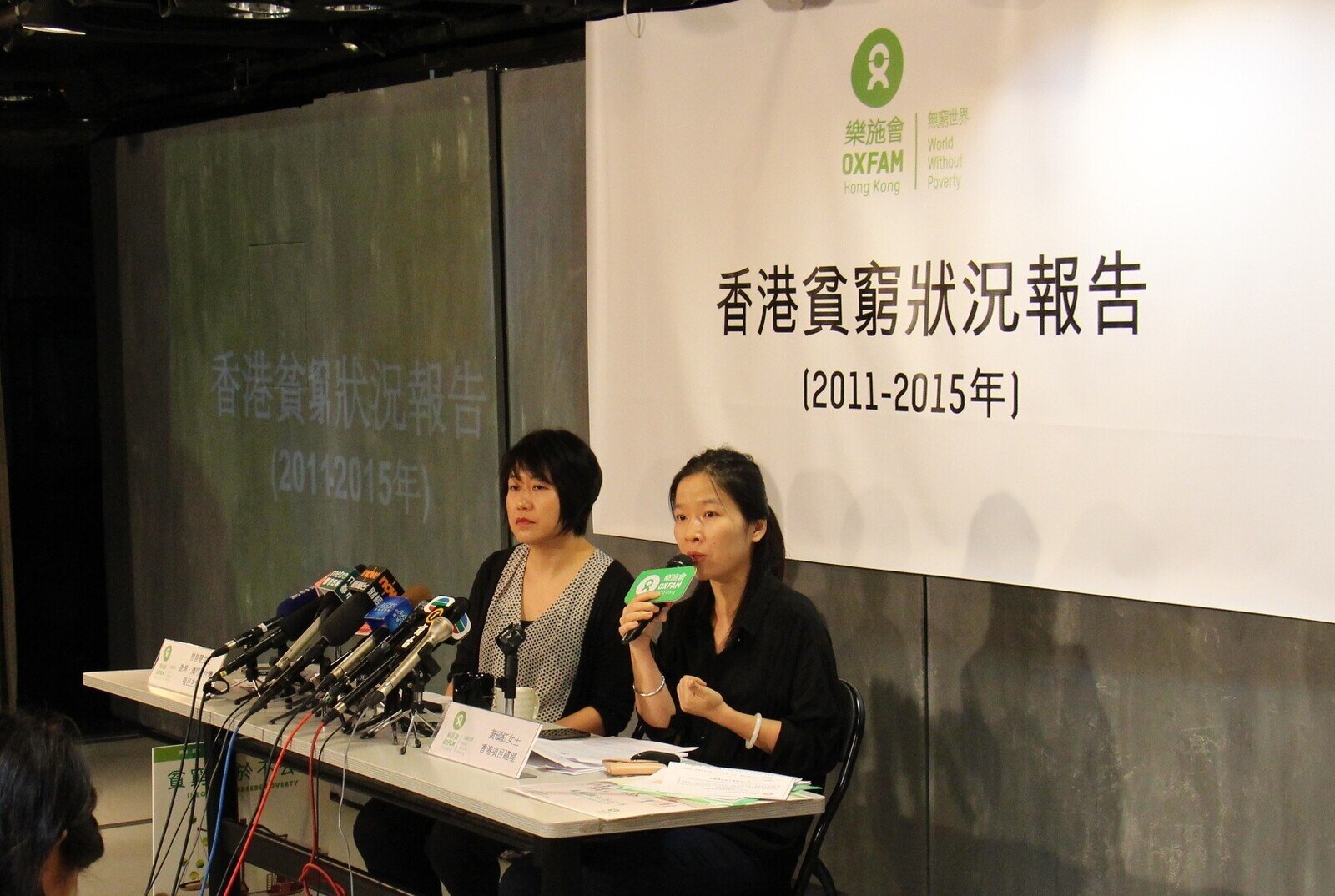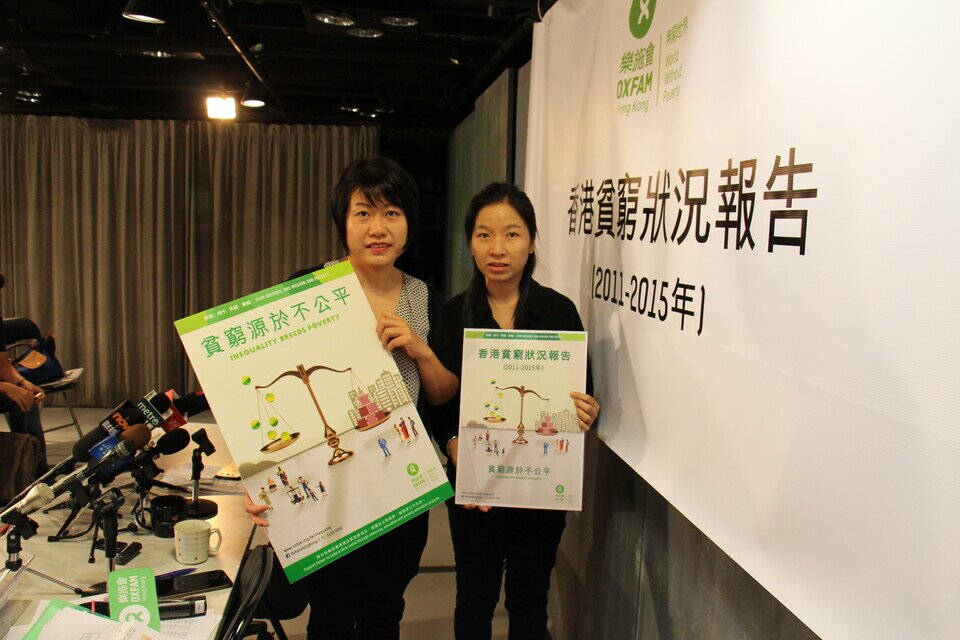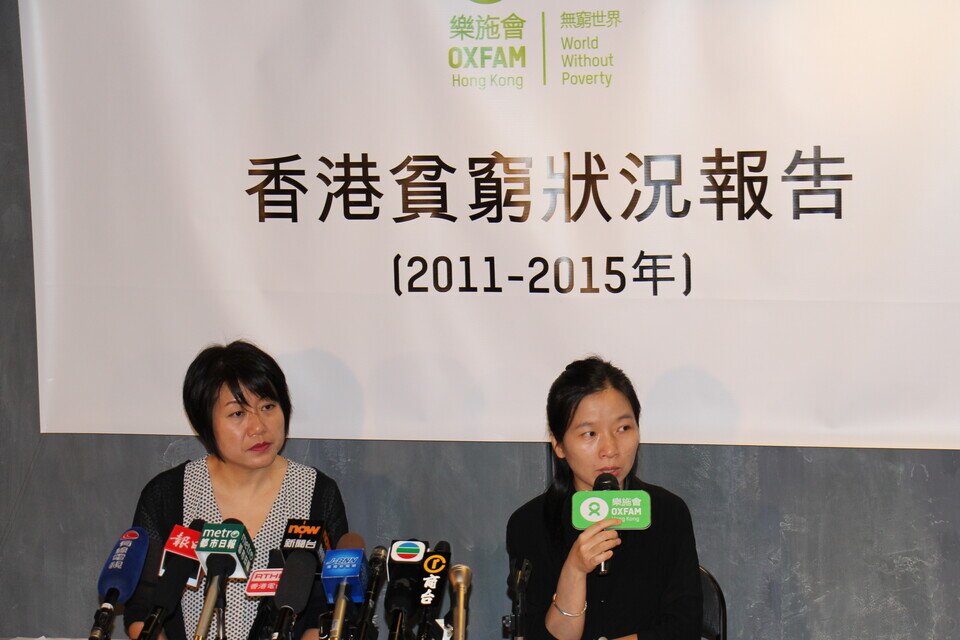11 OCT 2016
Local wealth inequality worsens as richest earn 29 times more than poorest
Oxfam urges the Government to scrap the MPF offset mechanism and review the CSSA elderly application process
The ‘Hong Kong Poverty Report (2011-2015)’, which was released today by Oxfam, reveals that the number of poor households has been on the rise and reached 460,000 in 2015. Wealth disparity in Hong Kong is now worse than other developed regions in the world. Oxfam thus urges the Government to make progressive policy changes to address the problem through such initiatives as reviewing minimum wage annually, taking the lead to abolish the MPF offsetting mechanism, improving the CSSA system and scrapping the ‘bad son statement’-the statement children need to make to declare that they will not provide their parents with financial support.
The report examines data from the Census and Statistics Departments’ General Household Survey between 2011 and 2015. In the report, working poor families are defined as households that have at least one employed person (excluding foreign domestic helpers) and earn a monthly household income of less than half of the median income for all households of the corresponding size.
The report shows that the widening wealth gap has reached an alarming level. According to Forbes magazine (August 2016), the collective wealth of the richest 18 people in Hong Kong amounts to 1.39 trillion, which exceeds the Hong Kong government’s reserve of 1.38 trillion. Meanwhile, the top 10 per cent earns 29 times more than that of the poorest 10 per cent. In other words, the latter has to work two years and five months in order to earn what the top 10 per cent earns in a single month.
The number of poor families in 2015 jumped a staggering 6 per cent from figures in 2011. A total of 1.15 million people currently live in poverty; the poverty rate of general households in Hong Kong slightly increased from 18.5% in 2011 to 18.7% in 2015.
One in three elderly citizens live in poverty. In 2015, there were 230,000 poor families that had members aged 65 or above; this number jumped up by more than 14 per cent compared to 2011. Among these families, almost 60 per cent are one- or two-person households; currently, these two groups are growing at a rapid rate of 25 per cent and 18.6 per cent respectively. This shows that an increasing number of poor elderly persons are living alone with limited assistance. In 2014, there were 280,000 households with elderly persons and their monthly incomes were lower than the CSSA payment level. Only 54 per cent of these households applied for CSSA; many do not apply because of the notorious ‘bad son statement’.
Besides poverty among the elderly, the issue of working poverty calls for equal concern. More than 620,000 people live in about 180,000working poor households. On the other hand, the number of working poor households with one employed person skyrocketed by 44 per cent in the past five years. Working poor households bear a heavy burden, with each employed member of a working poor household supporting two non-working members.
Among the working poor households, more than half (55.5 per cent) make a monthly income of less than the average CSSA payment for households of the corresponding size. However, only 6.3 per cent are CSSA recipients. Most of these families clearly want to work their way out of poverty, but with minimum wage lagging behind inflation, these poor families have difficulties in making ends meet. In fact, inflation negatively affects the lower income group more than any other group. The Consumer Price Index (CPI) (A), which reflects the impact of inflation on the lower income group, remains a significant one to two percentage points higher than CPI(B) and Composite CPI.
Indeed, low-income workers from certain industries have seen their purchasing power drop over the past five years as salary increases have been cancelled out by inflation. Since the Minimum Wage Ordinance was passed in October 2010, cumulative inflation has reached 24 per cent. The purchasing power of the current minimum wage ($32.5) is only equivalent to $26 back in 2010, which is even lower than the then minimum wage of $28.
Furthermore, the Low-income Working Family Allowance has received far fewer applications than the Government had expected. With stringent requirements, complicated application procedures, language and communication barriers faced by ethnic minority families, it is clear why this is.
‘Oxfam believes that a just society should ensure that the poor have the right to lead a dignified life. The growth of the economy or any profit making craze should not be at the cost of worker’s livelihoods. Over the past five years, Hong Kong's total wealth has increased, yet more than 180,000 households still live in poverty despite their hard work. This is totally unacceptable especially in an affluent society like Hong Kong. Business leaders should bear more corporate social responsibility in the face of this growing wealth gap,’ said Oxfam’s Hong Kong Programme Manager, Wong Shek-hung. Oxfam urges the Government to adopt progressive policy changes to address these inequalities. The organisation proposes the following:
1. The Government should take the lead in scrapping the MPF offsetting mechanism. Between 2011 and 2015, $13.6 billion in MPF contributions was offset by employers. Under this mechanism, low-income workers are less protected and are at risk of falling into poverty after retirement. Moreover, some are forced to rely on CSSA after retiring, leaving society to pay the price because of this unfair offsetting system. Oxfam thus urge the Government, as the largest employer, to take the lead in scrapping the MPF offsetting mechanism in order to protect all of its contracted and outsourced employees. In addition, it should set a timetable to minimise the MPF offsetting mechanism ratio and scrap the mechanism in the long run. Since the mechanism is written in the Employment Ordinance and the Mandatory Provident Fund Schemes Ordinance, the Government should propose relevant amendments to the above ordinances in order to implement the abolition step by step.
2. The Government should scrap the ‘bad son statement’ and improve the CSSA Scheme. It should allow elderly applicants to apply for CSSA by simply declaring that they are not taken care of by their children. Furthermore, the Government should allow the elderly to apply for CSSA independently to avoid the separation of the elderly and their children. Financial support from the Government and family care should not be mutually exclusive; allowing them to coexist would help the Government realise its aim of having the elderly ‘age in place’. Thirdly, by exempting part of the housekeeping money as elderly recipients’ income (i.e. the maximum amount of the disregarded earnings), the elderly would not have part of their CSSA payments cut, and this would encourage their children to provide them with financial support.
3. The eligibility of the application of the Low-income Working FamilyAllowance should be reviewed. The Government should take into consideration low-income families working situation. Application procedures can be simplified and red tape removed. Moreover, more assistance should be provided, including form filling services, application follow-up, multi-language forms and translation services for ethnic minority families.
4. The Government should review minimum wage annually, and ensure that it is adjusted to keep up with inflation and stays above theCSSA payment level. We urge the Minimum Wage Commission to take into consideration three principles. First, minimum wage should keep up with inflation. Second, minimum wage should allow any employed family member to support one non-working family member. Third, minimum wage should be kept at a level that is higher than the CSSA payment level in order to keep their motivation to work. Take a two-person family as an example. The average CSSA payment for a two-person household is $8,560, which is equivalent to earning $35 an hour. In view of this, the minimum wage this year should be set at $35 or above.
5.The official poverty line should take the ‘basic cost of living’ into consideration. At present this line is set at half of the median monthly household income. This helps demonstrate income differences within society but pays no attention to expenditure differences. We invite the Government to consider a poverty line that reflects the basic cost of living. This is a more accurate way of calculating the size of the population living in poverty, the pattern of their expenditure and their characteristics so that more suitable poverty alleviation measures can be implemented.
‘The report shows that the wealth gap has widened considerably over the past five years. As the Commission on Poverty (CoP) is about to release its latest report, Oxfam urges the CoP, Government, Legislative Council and business sector to consider our policy suggestions so that more pro-poor policies will be formulated and that the structural causes of poverty in Hong Kong will be effectively tackled,’ said Kalina Tsang, Head of Oxfam’s Hong Kong, Macau, Taiwan Programme.
- Ends -
About Oxfam
Oxfam is a worldwide development organisation that mobilises the power of people against poverty.
For media enquiries, please contact:
Wong Shek-hung | Clara Law
|
Wong Shek-hung, Oxfam’s Hong Kong Programme Manager (right), and Kalina Tsang, Head of Oxfam’s Hong Kong, Macau, Taiwan Programme (left), shared Oxfam’s latest report, which revealed that local wealth inequality has worsened as the richest earn 29 times more than poorest.
Wong Shek-hung, Oxfam’s Hong Kong Programme Manager (right), and Kalina Tsang, Head of Oxfam’s Hong Kong, Macau, Taiwan Programme (left), urge the Government to make progressive policy changes by reviewing minimum wage annually, taking the lead to abolish the MPF offsetting mechanism, improving the CSSA system and scrapping the 'bad son statement'.



